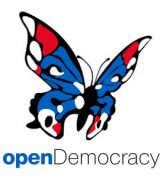
openDemocracy
openDemocracy offers in-depth news analysis and commentary from a pro-Democracy, pro-Human Rights perspective.
openDemocracy is committed to human rights and democracy. We aim to ensure that marginalised views and voices are heard. We believe facilitating argument and understanding across geographical boundaries is vital to preventing injustice.
Beyond and behind the headlines
We won’t tell you what to think. We offer you a spectrum of ideas, from the people who have lived through the events, from those on the ground making a difference, from scholars with expert knowledge. In-depth, independent, inside.
Our writers provide you with the background information you need to challenge the politics of any place. Every day, we publish new articles and opinions.
50.50 – Towards democratic debate
A global debate without the female half of humanity is neither global nor democratic. With this in mind, openDemocracy‘s 50.50 initiative is building a series of editorial projects designed to make openDemocracy a current affairs forum which is written, read and used equally by women and men.
Website: www.opendemocracy.net
Facebook: www.facebook.com/openDemocracy
Twitter: https://twitter.com/opendemocracy
YouTube

Associate's Articles
The multiculturalism recently attacked by David Cameron bears little in common with the integration policies pursued by previous British governments, writes Cécile Laborde. What it does resemble is a securitization approach that places citizens under suspicion on the basis of their religion.
Scapegoater hunted down as a witch
Geert Wilders and the Dutch press
Judgmental journalism directed at members of parliament is an orchestrated form of “mob-justice” in the Netherlands today. Self-appointed media watchdogs present a bigger danger to society than the persons they pursue, writes Tjebbe van Tijen.
The advance of populist anti-Islamic forces in the liberal bastions of northern Europe – Denmark, the Netherlands and Sweden – appears to reflect a betrayal of these societies’ renowned social tolerance. But there is a more subtle logic at work, says Cas Mudde.
The International Court of Justice ruling on Kosovo’s declaration of independence will not herald a sea-change in Serbian public opinion, but it is likely to facilitate a general coming-to-terms with the fact that Kosovo is “lost”, writes Florian Bieber. The much-feared “domino effect” is also unlikely to occur.
The sorry tale of British higher education policy
Elitism, philistinism and populism
In the UK, pressure from government to transform university programmes outside elite institutions into vocational training programmes creates a situation where “employability” becomes the sole goal of higher education, writes Jeremy Gilbert in an article first published in January 2010. What is offered under the guise of “university education” will soon be no more than a form of tertiary training for the service, retail and media industries.
"The most important thing here is self-discipline...".
The Khodorkovsky-Ulitskaya correspondence
“Looking for loopholes in the law and exploiting them – this was the most that we allowed ourselves. And we got our kicks from showing the government the mistakes it had made in legislation.” Translated excerpts from the correspondence between Mikhail Khodorkovsky and novelist Lyudmila Ulitskaya, first published in 2009 in Novaja Gazeta.
There is near universal consensus that a multilateral treaty is the only way to reduce global carbon emissions. Yet experience shows that deals focused on top-down mechanics fail, writes Simon Zadek. Unilateral action based on national self-interest is the only hope we have of effectively managing climate change.
Fragmented memory. Stalin and Stalinism in present-day Russia
Stalin and Stalinism in present-day Russia
As contemporary witnesses disappear, collective memory in Russia is altering, writes the director of Memorial. The hardships of war and the Stalinist terror are being forgotten and Stalin is being remembered as the victor over the essence of evil.